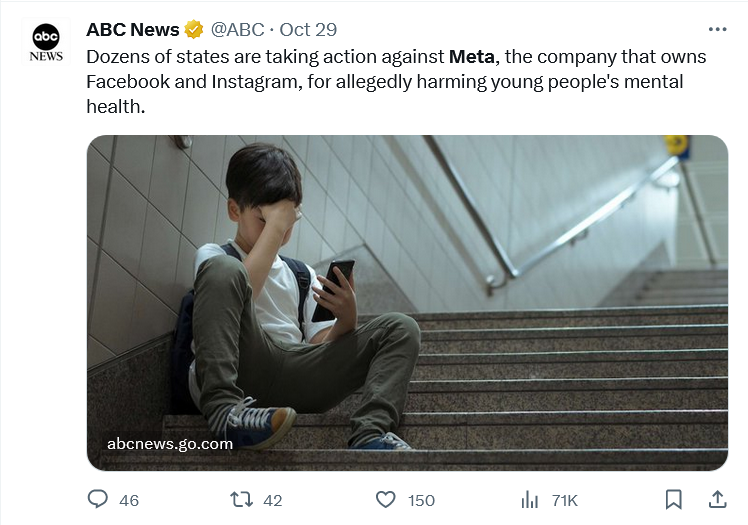
- Lawsuit sees Meta sued across the US, potentially costing millions of dollars in penalties.
- Instagram and Facebook trialling paid subscriptions in Europe.
- The new Meta lawsuit could see the company paying out millions of dollars.
Dozens of US states are bringing a new Meta lawsuit, accusing Meta platforms and its Instagram unit of fuelling a youth mental health crisis by making their platforms addictive.
In a complaint filed Tuesday last week, the attorneys general of 33 states including California and New York said Meta repeatedly misled the public about the dangers of its platforms and knowingly induced young children and teenagers into addictive and compulsive social media use.
“Meta has harnessed powerful and unprecedented technologies to entice, engage, and ultimately ensnare youth and teens,” according to the complaint filed in the Oakland, California federal court. “Its motive is profit.”
Children and young people are an appealing demographic to businesses: attracting them as consumers while they’re more impressionable to solidify brand loyalty. It’s a strategy as old as cigarettes and as pernicious as fizzy soft drinks.

Much of the focus on Meta stemmed from a whistleblower’s release of documents in 2021 that showed the company knew Instagram, which began as a photo-sharing app, was addictive and worsened body image issues for some teen girls. | REUTERS
For Meta, young consumers might secure more advertizers, who hope children will keep buying their products as they grow up.
Unfortunately for profit margins, research has associated children’s use of Meta’s social media platforms with “depression, anxiety, insomnia, interference with education and daily life, and many other negative outcomes.”
Meta said it was “disappointed” in the lawsuit – a paternalistic response that paints the attorneys general themselves as spoilt children.
“Instead of working productively with companies across the industry to create clear, age-appropriate standards for the many apps teens use, the attorneys general have chosen this path,” the company said.
Similar lawsuits are being filed against Meta by eight other US states and Washington DC. The total number of authorities taking action against the company is 42. Meta’s shared fell 0.6% on the Nasdaq.
There have been a string of legal actions against social media companies on behalf of children and teens recently. ByteDance’s TikTok and Google’s YouTube already face hundreds of lawsuits pertaining to the addictiveness of social media.

It may not be your fault if your child can’t stop scrolling. They may be on eyeball-crack – or Instagram, as it’s also known.
In the past, Mark Zuckerberg has defended his company’s handling of content that some critics find harmful, saying, “At the heart of these accusations is this idea that we prioritize profit over safety and well-being. That’s just not true.”
This case could see Meta facing civil penalties of $1,000 to $50,000 for each violation of various state laws – an amount that could add up quickly.
The Meta lawsuit came after focus was put on the company due to a whistleblower’s release of documents in 2021 that showed the company knew Instagram was addictive and worsened body image for some teen girls.
The lawsuit alleges that Meta has worked to ensure young people spend as much time as possible on social media, despite knowing they’re susceptible to the need for approval that is satisfied by “likes” from other users.
“Meta has been harming our children and teens, cultivating addiction to boost corporate profits,” said California Attorney General Rob Bonta, whose state includes Meta’s headquarters.

Rob Bonta has spoken out against Meta’s practices. (Photo by Hans Gutknecht/MediaNews Group/Los Angeles Daily News via Getty Images)
Meta is also accused of violating a law banning the collection of data on children under 13, as well as deceptively denying the harms of its social media.
“Meta did not disclose that its algorithms were designed to capitalize on young users’ dopamine responses and create an addictive cycle of engagement,” the complaint said.
The complaint asserts that Meta’s refusal to accept any responsibility for the young people using the app extended as far as distancing itself from a 14-year-old girl’s suicide in the UK after she was exposed to content about suicide and self-injury on Instagram.
A coroner rejected a Meta executive’s claim that such content was “safe” for children, finding that the girl likely binged on harmful content that normalized the depression she had felt before killing herself.
By suing, authorities are aiming to patch holes left by the US Congress’ inability to pass new online protections for children despite years of discussions.
Colorado Attorney General Philip Weiser said the whistleblower’s revelations showed Meta knew how Facebook and Instagram were harming children.
“It is very clear that decisions made by social media platforms, like Meta, are part of what is driving mental health harms, physical health harms, and threats that we can’t ignore,” he said.
Meta lawsuit: making back the money?
Not a direct response, but Facebook and Instagram seem to be mitigating money lost in lawsuits and from ad revenue. Both platforms are launching subscriptions across Europe that will remove adverts from the platforms.
People using Meta’s platforms will be able to pay €9.99 ($10.64) monthly for an ad-free experience. It won’t be available in the UK.
In January this year, Meta was fined €390m (around $41m) for breaking EU data rules around ads. The regulator said at the time that the firm could not “force consent” by saying consumers must accept how their data is used or leave the platforms.
Access to the subscription tier will only be available in the EU, European Economic Area and Switzerland, and only to over 18-year-olds. The firm will look into how it can serve ads to children without breaking the rules.
Meta says its new subscription is about addressing EU concerns, not making money.
“We believe in an ad-supported internet, which gives people access to personalized products and services regardless of their economic status,” the firm wrote in a blog.
“The option for people to purchase a subscription for no ads balances the requirements of European regulators while giving users choice and allowing Meta to continue serving all people in the EU, EEA and Switzerland.
“We respect the spirit and purpose of these evolving European regulations and are committed to complying with them.”
Users can choose between continuing to use the platforms for free – and having their data collected – or to pay and completely opt out of targeted ads. They could end up paying more than their initial monthly fee, though: the service will cost an additional €3 per month if paid for on iOS or Android, to account for the additional fees taken by these platforms.
To avoid the charge, subscriptions can be paid for directly on the Facebook and Instagram websites, rather than on mobile apps.
Further, from March 2024, users will have to pay more for each additional account they have on the platform – like having a business and personal account.
All of this comes after Elon Musk announced paid subscriptions for X would be trialled. There’s a cheaper subscription tier on X, which will still feature ads but allow users to edit their posts, and a standard premium tier that grants a blue checkmark among other things.
The backlash to all that ought to have shown that charging for social media use might push many offline, but instead it seems the idea will become a new norm. TikTok has also tested a monthly subscription service to remove ads, but as yet there’s no indication it will be rolled out globally.










